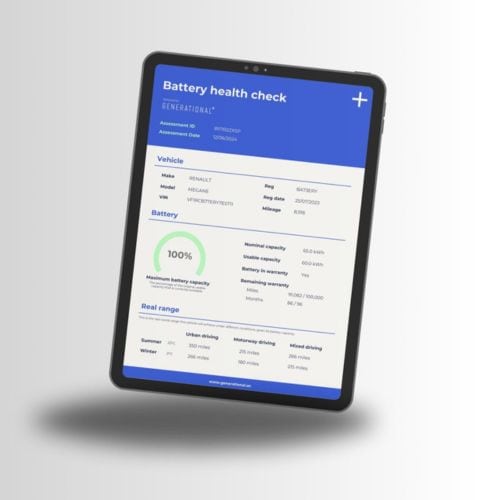A guide to EV battery health checks
Our full guide to the most frequently asked questions about all things related to EV battery health testing.
10/7/2024 – 2 min read
What are EV battery health checks?
Battery health checks are diagnostic tests that assess the condition and performance of electric vehicle batteries.
Our solution provides dealerships with accurate and fast way to certify the battery health of pre-owned EVs.

Why should you test EV batteries?
Our customers tend to find these are the most important benefits:
Differentiate their stock in the competitive EV market
Build trust with potential buyers
Reduce the risk of part-exchanges and customer returns
Accurately price pre-owned EVs
How does it work?
Our test is designed for vehicle trade use and typically takes around 2 minutes to complete. Just plug in our OBD dongle directly to the vehicle’s onboard diagnostics port, then use our mobile application to start the test.
Our test reports the State-of-Health from the vehicle’s Battery Management System (BMS), which yields the same value as using an official manufacturer diagnostic tool.
This methodology is in line with the Car Remarketing Association Europe (CARA) guidelines.
What does State-of-Health mean?
The State-of-Health (SoH) is a percentage value that indicates the current usable capacity of the battery compared to its original usable capacity when new.
What information does a battery health check show?
The official check is available via a unique URL printed on every PDF certificate, which is the definitive source of this data. On our full battery health check, we show the following data points:
Assessment ID (unique)
Vehicle details (Make, Model, VIN, Registration, Mileage)
Battery SoH
Battery usable and nominal capacity
Battery warranty details (including warranty remaining)
Real-world range for that individual vehicle under different conditions
What warranties do manufacturers offer?
Manufacturers offer different warranties on their batteries. Most OEMs guarantee that EV batteries will retain at least 70% of their original capacity after 8 years or 160,000 km, whichever comes first.
However, some manufacturers may offer warranties above or below these levels – if this is the case we report it on our certificates.
What factors affect the SoH of a battery?
We will follow up with more on this in a dedicated blog, but the following factors have all been proven to play a role in how fast a battery degrades:
Age
Average SoC level
Rapid charging
Driver behaviour
Factory variation
Deep discharges
Any other questions? Drop us a message!
